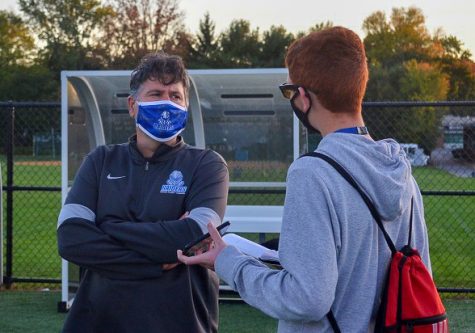Ghosts That Never Part: A Conversation on Macbeth, Bruce and Spirits
April 26, 2022
Editor’s Note: Since today is Shakespeare’s 458th birthday, we present to you an analysis of Shakespeare’s famous tragedy “Macbeth” and a lesson on ghosts.
Bruce Springsteen embraces ghosts. He is reminded of the people, the places, the things that helped get him to where he is now. Unlike in Macbeth by Shakespeare, Springsteen sees these ghosts as gifts — memories that become sweeter with time; vital learning experiences that molded him and gave way to his immense success. Macbeth is the antithesis of Bruce. Macbeth kills his gifts; he drives away everyone and everything that he loved and loved him back. Shakespeare’s climax presented in act three centers around Macbeth murdering his best friend Banquo and being haunted by Banquo’s ghost to examine a painful struggle for power fueled by paranoia, envy, and fear, highlighting the necessity of trusting your circle and those closest to you.
While it is no secret that Macbeth’s rule of Scotland is an utter catastrophe, the real catastrophe is his lack of appreciation for those closest to him: Banquo and Lady Macbeth. Macbeth’s downfall became inevitable the day he allowed greed, paranoia, and envy to seep into his relationships with Banquo and Lady Macbeth. Once he is named King, Macbeth shuns them like a moody teenager shuns their parents. In Act III when Lady Macbeth asks what Macbeth plans to do to Banquo, Macbeth replies, “Be innocent of the knowledge, dearest chuck.” After Lady Macbeth challenges the manhood of an uneasy, apprehensive Macbeth to kill Duncan (the former King who Macbeth kills to become King), Macbeth locks his wife out of his plans, treating her as second fiddle during his rule. He goes rogue, killing his former best friend Banquo and attempting to kill Fleance (Banquo’s son). Macbeth is challenging fate — the witches’ spells — by attempting to kill Fleance, as the Weird Sisters proclaimed earlier in the play that Banquo’s son would one day rule as the King of Scotland. It wasn’t the murder of Duncan or the murder of Banquo that dooms Macbeth’s rule; it’s the day that he believes he can do it by himself, the day he goes it alone. Nobody can reach the zenith alone.
At a dinner party amongst the Thanes and Lords of Scotland, Macbeth is haunted by Banquo’s ghost — a spirit that paralyzes Macbeth and reminds him of the betrayal of his best friend, the man he shared memories with on the battlefield and the man who saw Macbeth in his most vulnerable moments. The ghosts that Bruce writes about are similar to those of Macbeth, but Bruce is not haunted by them. Springsteen finds peace amongst the ghosts because they have molded him into who he is: the legacy he has as a songwriter, the music he creates, the generational wealth that he leaves behind. It’s a stark contrast to Macbeth who, when becoming King, finds his ghosts and demons unleashed. He cannot function at the dinner party because all he can see is Banquo’s silhouette. The situation is so dire that Lady Macbeth ends the dinner party early and sends everybody home. And it only goes downhill from there. By the end of the play, Macbeth has no friends, all of his allies have been driven away, his wife commits suicide, he kills his best friend Banquo in an attempt to alter fate, he suffers from tremendous emotional pain, and he fights a losing battle against 10,000 English soldiers. The Tragedy of Macbeth is applicable to life. There should be signs everywhere that read, “Don’t be like Macbeth,” as it is a warning to never become too big. There is no such thing as being greater than somebody else, greater than the world, and fate itself. In the song “Red Lights,” Brian Fallon writes, “When you change too much, you lose yourself and sometimes you just can’t get them back.” Who is the “them” that Fallon writes about? It must be the people like Lady Macbeth — the collateral damage, the ones suffering emotional pain while the person afflicting the emotional pain is blinded by foolish ambitions. The core of Macbeth isn’t kings, queens, and murder; it’s an identity crisis. And what happens during an identity crisis? How do you refind yourself? The answer is in the words of Springsteen during his 2000 Madison Square Garden performance of “Tenth Avenue Freeze-Out”: “You can’t get there by yourself, you’ve got to have help. You need a band.” It is impossible to not recognize the parallels between “Tenth Avenue Freeze-Out,” and Macbeth: the difference in approach, the outcome, and the inevitable conclusion that one cannot achieve anything meaningful without help.
A council, a circle, a band — everybody needs one. The day one believes they can go it alone is the day they doom themselves.




